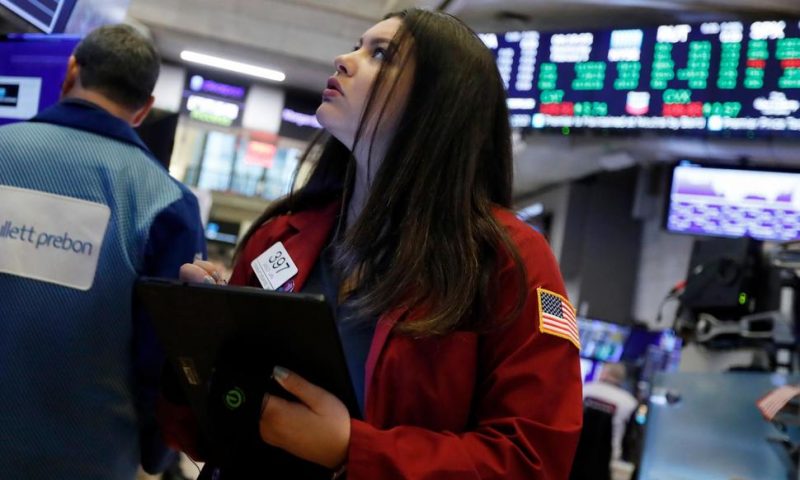The S&P 500 returned to a record Wednesday, and technology stocks once again helped lead the market higher.
NEW YORK — U.S. stocks shook off their latest virus-induced loss and returned to record heights Wednesday, with several familiar faces doing the heaviest lifting.
Technology stocks helped lead the market higher, as they’ve been doing for years, and Apple rallied to recover most of its loss from the prior day. It dropped Tuesday after warning that revenue this quarter would fall short of forecasts due to the viral outbreak centered in China.
Worries remain about how disruptive the virus will be for manufacturing, travel and other economic activity across the region, but markets around the world rose as the number of new virus cases in China fell Wednesday. Expectations are also high that China and other central banks around the world will limit the economic damage through injections of cash into markets, lower interest rates and other stimulus measures, said Shawn Cruz, manager of trader strategy at TD Ameritrade.
The S&P 500 rose 15.86 points, or 0.5%, to 3,386.15 and surpassed its record set last week. The Dow Jones Industrial Average gained 115.84, or 0.4%, to 29,348.03. The Nasdaq climbed 84.44, or 0.9%, to 9,817.18 and also set a record.
“I think markets are a little too rosy now,” Cruz said. “There is this assumption that the actual impact won’t be much, and if there is one, central banks will be able to step in and keep us alive.”
The problem arises if the virus lasts longer and does more damage than markets seem to be anticipating. “It seems like everyone is on the same side of the trade that this is going to be fine, which raises the potential for everyone to run for the door at the same time if central bank injections of cash aren’t going to cure anybody,” Cruz said.
Raising the potential volatility even more in such a scenario, Cruz said the companies most at risk to slowdowns in China are also those that have grown to become some of the biggest components of the S&P 500. That gives their movements outsized effects on index funds.
For now, at least, investors seem to be confident that China’s central bank, the Federal Reserve and other central banks can prop up the economy.
Low rates have been a key underpinning for the strong U.S. stock market, which has rallied even though growth in corporate profits has been weak. The Fed released minutes Wednesday afternoon from its last policy meeting, where officials said they see the current level of monetary policy “as likely to remain appropriate for a time,” at least until data on the economy shows a change in momentum.
Treasury yields rose Wednesday morning following a pair of stronger-than-expected reports on the U.S. economy. One showed stronger housing construction data than economists expected, while another showed inflation was higher than expected on the wholesale level in January.
But yields moderated as the day progressed. The yield on the 10-year Treasury rose to 1.56% from 1.55% late Tuesday, after earlier being as high as 1.58%. The two-year yield climbed to 1.41% from 1.39% after earlier touching 1.44%.
A generally still-slow global economy has put the spotlight on companies that are nevertheless able to produce strong revenue and profit growth, and that’s why tech stocks have been the market’s biggest stars for years.
On Wednesday, they once again helped pace the market. Besides Apple’s 1.4% gain, Nvidia jumped 6.1% and Advanced Micro Devices rose 3.5%. As a group, tech stocks in the S&P 500 climbed 1.1% for the second-largest gain among the 11 sectors that make up the index.
Tech stocks in the S&P 500 have surged 47.7% over the last 12 months, nearly double the rise for any of the index’s other sectors.
A longtime laggard was also high up the day’s leaderboard. Energy stocks in the S&P 500 jumped 1.3%.
They climbed with the price of crude oil, while Concho Resources leaped 7.6% for the biggest gain in the S&P 500 after reporting stronger quarterly results than analysts expected.
The sector has been struggling as worries about weaker demand have weighed on the price of oil. Energy stocks have lost 15.5% over the last 12 months, the only sector in the S&P 500 to be down over that time.
Benchmark crude oil rose $1.27 to settle at $53.29 a barrel. Brent crude oil, the international standard, rose $1.37 to $59.12a barrel.
European stock markets also rallied, and the French CAC 40 climbed 0.9%. Germany’s DAX returned 0.8%, and the FTSE 100 jumped 1%.
In Asia, Japan’s Nikkei 225 rose 0.9%, the Hang Seng in Hong Kong added 0.5% and South Korea’s Kospi inched up 0.1%. Stocks in Shanghai lost 0.3%.
Wholesale gasoline rose 5 cents to $1.66 per gallon. Heating oil climbed 4 cents to $1.71 per gallon. Natural gas fell 2 cents to $1.96 per 1,000 cubic feet.
Gold rose $7.50 to $1,607.50 per ounce, silver rose 16 cents to $18.29 per ounce and copper was unchanged at $2.61 per pound.
The dollar rose to 111.58 Japanese yen from 109.88 yen on Tuesday. The euro strengthened to $1.0796 from $1.0794.

